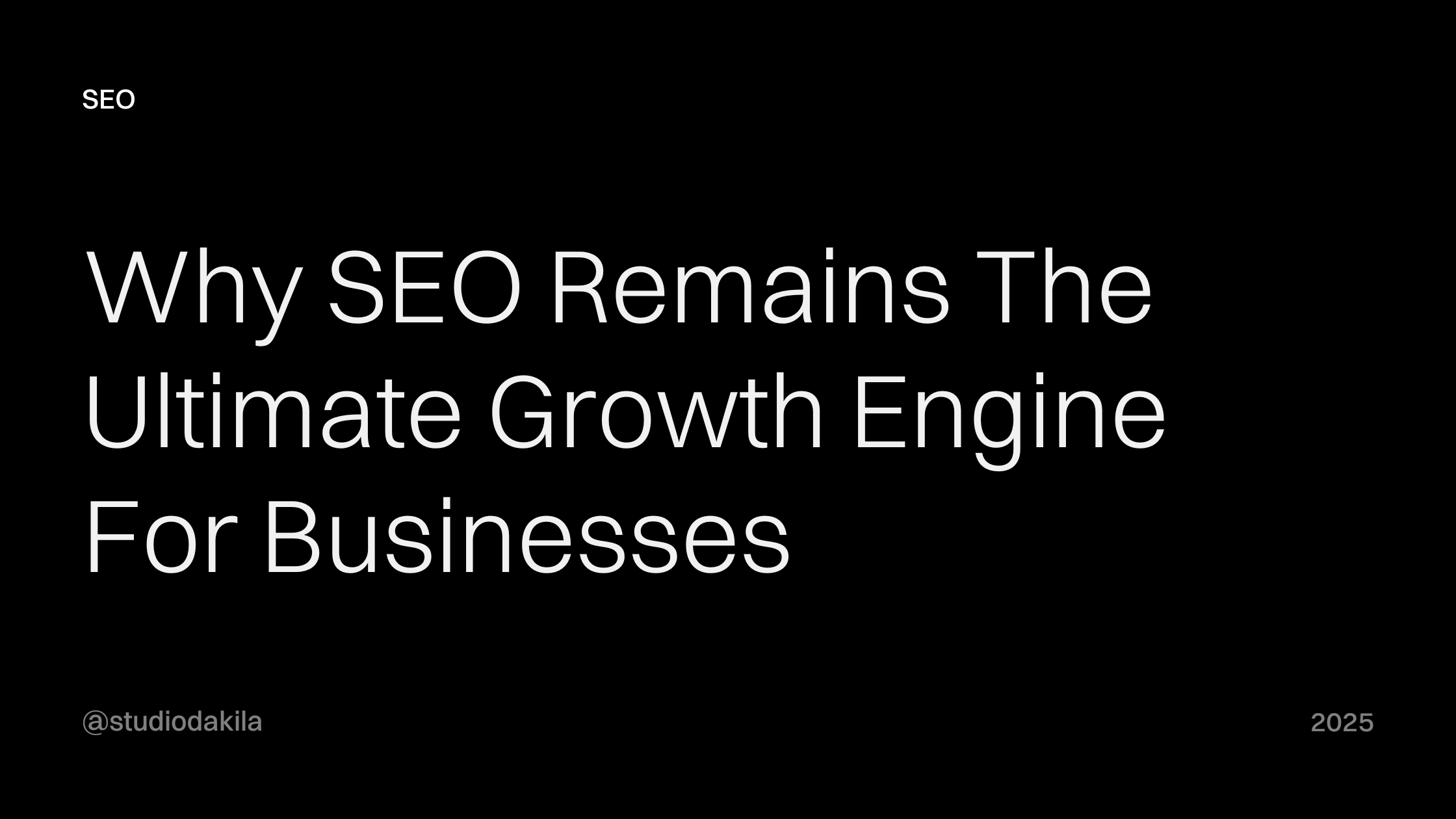SEO for B2B companies continues to stand as the foundation of sustainable online visibility and business growth in today’s evolving digital landscape. As algorithms grow increasingly sophisticated, organizations that understand the power of search optimization thrive, while those who ignore it fall behind. Many businesses still view SEO as either an optional luxury or a confusing technical exercise rather than what it truly is: a fundamental business necessity with transformative potential.
The reality is that B2B search engine optimization offers distinct advantages for organizations at every stage of development. From local startups to global enterprises, the principles of search optimization adapt to meet unique business needs while delivering consistent value. What varies is not whether SEO matters, but how it should be implemented and prioritized based on your specific goals and resources.
Let’s explore why search engine optimization remains the ultimate growth engine for B2B businesses of all sizes in today’s digital economy, and how current industry trends are reshaping what effective SEO looks like in practice.
Small Business SEO: Local Dominance Through Digital Presence
For small B2B businesses, the SEO landscape offers particularly fertile ground. While they may lack the resources of larger competitors, small companies can leverage several inherent advantages in search visibility.
Local search has evolved dramatically in recent years. Google reports that searches containing “near me” have grown by over 900% in the past few years. For small B2B businesses with physical locations, local SEO represents the digital equivalent of prime real estate. A properly optimized Google Business Profile combined with consistent NAP (Name, Address, Phone) information across the web can place a small business directly in front of motivated local business customers.
The trend toward hyper-local search continues to accelerate. Mobile searches for “where to buy” plus a product category have grown by over 200% in recent years. Small B2B businesses that optimize for these specific local intent signals gain disproportionate visibility compared to their actual size.
Another significant advantage for small businesses lies in their ability to create authentic, location-specific content that resonates with local audiences. Current trends show search engines increasingly favoring content that demonstrates genuine local expertise and community connection. Using tools like Mangools can help identify location-specific keywords that your competitors might be missing.
Mid-Size Business SEO: Scaling Search Visibility Through Strategic Focus
Mid-size B2B businesses face a unique set of challenges and opportunities in the SEO landscape. With greater resources than small businesses but without the extensive infrastructure of enterprises, mid-size companies must be particularly strategic about how they allocate their SEO investments.
The current trend toward topical authority rather than simply keyword targeting creates natural advantages for mid-size businesses. Search engines increasingly evaluate content based on comprehensive coverage of topics rather than individual keyword optimization. Mid-size B2B businesses can develop content clusters around their core products or services, establishing themselves as authoritative sources in specific niches.
Industry data shows that websites with comprehensive topic coverage typically outperform those targeting isolated keywords. A mid-size business can realistically create authoritative content hubs that smaller businesses lack resources to develop, while maintaining more focus than larger enterprises that must cover broader territory.
Data-driven storytelling becomes especially important at this stage. By combining analytical insights with compelling narratives, mid-size B2B companies can create content that not only ranks well but also genuinely engages their target audience. This approach transforms dry industry data into meaningful stories that resonate with potential clients.
Enterprise SEO: Leveraging Scale While Maintaining Agility
For large B2B enterprises, SEO represents both tremendous opportunity and significant complexity. The scale of enterprise websites, often encompassing thousands or even millions of pages across multiple domains and subdomains, creates unique challenges that require specialized approaches.
Current enterprise SEO trends emphasize the integration of search optimization with broader digital marketing strategies. Research shows that organizations with fully integrated SEO programs achieve significantly higher returns than those treating SEO as an isolated channel. This integration allows enterprises to leverage their scale across multiple touchpoints in the customer journey.
International SEO has become increasingly sophisticated, with search engines better able to understand language nuances and regional search intent. Enterprises operating across multiple countries can implement hreflang tags, country-specific domains or subfolders, and localized content strategies to maximize visibility in each market.
For manufacturing and industrial businesses, industrial SEO requires specialized knowledge of complex technical products and services. These companies often need to optimize for highly specific industry terms while making technical concepts accessible to procurement teams who may not share the same depth of technical knowledge.
The Power of Thought Leadership in B2B SEO
One area where B2B companies of all sizes can gain significant SEO advantage is through thought leadership content. The power of thought leadership extends beyond immediate keyword rankings to establish brand authority, which search engines increasingly recognize as a ranking factor.
By positioning key team members as industry experts through well-researched articles, case studies, and analysis, B2B companies can build the expertise, authoritativeness, and trustworthiness (E-E-A-T) that Google explicitly looks for, especially in business-critical information.
Thought leadership content typically attracts high-quality backlinks naturally, as industry publications and other businesses reference insightful analysis. These quality backlinks remain one of the most powerful SEO signals, particularly for competitive B2B keywords.
Cross-Cutting SEO Trends Affecting All B2B Businesses
Beyond size-specific considerations, several significant trends are reshaping B2B SEO practices across the board. Understanding these shifts helps businesses of all sizes adapt their strategies accordingly.
User intent optimization has largely replaced keyword volume as the primary targeting criterion. Search engines now excel at understanding the purpose behind searches rather than just matching keywords. B2B businesses must create content that genuinely addresses user needs rather than simply incorporating target terms. This trend rewards authentic value creation over technical manipulation.
E-E-A-T (Experience, Expertise, Authoritativeness, Trustworthiness) factors continue to gain importance, particularly in business decision-making content. B2B companies must demonstrate genuine expertise through their content, establish authoritative credentials within their industry, and build trust through transparent practices and positive user experiences.
The integration of SEO with user experience design has become essential. Search engines now directly measure user experience metrics like loading speed, visual stability, and interactive responsiveness. These technical factors directly impact rankings across all business categories.
Implementing Effective B2B SEO Across Business Scales
Regardless of size, B2B businesses that achieve sustainable search success typically share several common approaches:
First, they recognize that SEO is fundamentally about creating value for users rather than manipulating algorithms. This user-centric philosophy guides all technical and content decisions, ensuring alignment with both search engine objectives and business goals.
Second, successful B2B businesses integrate SEO considerations throughout their organizations rather than isolating them within marketing departments. Product development, customer service, technical teams, and content creators all understand how their work impacts search visibility.
Third, they maintain consistent investment over time rather than pursuing sporadic campaigns. SEO results compound with sustained effort, and businesses that maintain steady optimization programs typically outperform those with intermittent attention.
Fourth, they balance technical optimization with authentic content creation. While technical foundations remain essential, search engines ultimately aim to reward content that genuinely serves user needs. The most successful programs excel at both technical implementation and value creation.
Finally, they adapt their strategies to their specific business context rather than following generic best practices. They understand which SEO elements matter most for their particular industry, audience, and business model, and they allocate resources accordingly.
The Future of B2B SEO Value
As search technology continues to evolve, several emerging trends suggest the future direction of SEO value for B2B businesses of all sizes:
Multimodal search capabilities are expanding rapidly. Google’s multisearch functionality allows users to combine images and text in search queries, while visual search tools continue to mature. B2B businesses that optimize for these emerging search modalities gain early advantages in visual discovery.
AI-driven search experiences like ChatGPT and Google’s SGE (Search Generative Experience) are reshaping how users discover information. These tools extract and synthesize content directly in search interfaces, potentially reducing traditional website visits. B2B businesses must adapt their content strategies to remain valuable in these new search paradigms.
Privacy regulations and the deprecation of third-party cookies are increasing the value of organic search data. As paid targeting options become more limited, B2B businesses that build strong organic search presence gain valuable first-party data about customer interests and intentions.
Ultimately, the B2B businesses that thrive in search will be those that most effectively balance technical excellence with authentic value creation. They will understand that while SEO tactics evolve constantly, the fundamental principle remains unchanged: creating genuinely useful content that deserves to be discovered.
Key Takeaways
- SEO for B2B companies requires a strategic balance of technical optimization and authentic content creation tailored to business buyers.
- Tools like Mangools can help identify valuable keyword opportunities that competitors are missing in your industry.
- Thought leadership content establishes E-E-A-T signals that search engines increasingly prioritize for business-critical information.
Take Your B2B SEO Strategy to the Next Level
We can help you develop a customized strategy that aligns with your business goals and target audience. From technical optimization to thought leadership content development, we’ll help you build a sustainable engine for organic growth.
Frequently Asked Questions
B2B SEO typically involves longer sales cycles, more technical content, and focuses on converting qualified leads rather than high-volume transactions.
Most B2B companies begin seeing measurable improvements within 3-6 months, with significant results developing over 6-12 months.
Both are essential components of a successful B2B strategy, as technical issues can prevent even excellent content from ranking properly.

